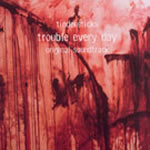|
|
 |
Dusted Reviews
Artist: Tindersticks Album: Trouble Everyday Label: Beggars Group Review date: Apr. 17, 2002 |

|
|
|
 |
Unless you live in France, one of America's two largest metropolises, or some random New England town that hosts a chic international film festival, you probably haven't seen or heard of Trouble Everyday. The latest film by director Claire Denis, director of Chocolat (a different Chocolat, not the noxious Miramax release) follows a doctor in Paris who succumbs to an extramarital affair with a bloodsucking vixen. There's more of course, but with super-hip Vincent Gallo playing the doctor, quite a bit of emotional realism gets thrown out the window. And though the Tindersticks, with a fine but brief discography behind them (including another score for director Denis), attempt to rekindle the flame of Last Tango in Paris, they neglect to include anything as sensuous as the latter NC-17 expatriate tale.
The best that could be said for the soundtrack to Trouble Everyday is that it serves its material well. A score's entire raison d'entre is to enhance the film that birthed it, whether narratively or emotionally. Here, thankfully, the British musicians making up the Tindersticks compose the film's entire soundtrack without falling into the typical over-the-top use of symphony orchestras and children's choirs. Never attempting to rise above the film itself, the score instead subtly complements the story and visuals.
Unfortunately, in the case of Trouble Everyday, the soundtrack is so dependent on the film that without it, the music is devoid of its emotional cues, with few exceptions. Ranging confidently between Les Baxter style lounge/ faux-exotica, and noir trumpets, the sound is reminiscent of several other classic scores (sounding oddly and randomly like John Barry's work on You Only Live Twice). The Tinderstick's work here never rises to exist as anything more substantial than a compliment piece to Denis' visuals. While that may be what anal academic film enthusiasts prefer, it is tough to justify spending 15 dollars on an album that is simply meek without its significant other.
Despite having many accomplished moments, the soundtrack is background music-pleasant, never challenging. The first track, "Titles," is a Serge Gainsborg-esque crooner, and lays the groundwork for the basic leitmotifs that are to repeated throughout the course of the album. Though the use of the strings are sparse, they do provide much of the track's (and the entire album's) backbone, punctuating marathons of muted trumpet or congo solos. "Titles," both lyrically and musically resembles Marianne Faithfull's appearance on Badalemti's City of Lost Children. Yet, while Faithfull's piece hints at the music to come, here the Trouble Everyday soundtrack constantly reiterates the first track, its themes, and singular mood throughout its duration.
Many of the pieces that follow are lightly drawn; delicate tiptoes of plucked strings and bass lines. The timing on these pieces is impeccable, a testament to the Tinderstick's maturity and tact not to distract from Denis' film. Tracks like "Maid Theme" go in and out of consciousness, occasionally silent, occasionally tight-lipped trumpet solos. The two following tracks, "Room 321"and "Computer," are basic blueprints of their predecessor, basically indistinguishable and pointless outside the context of the film.
The soundtrack reaches its pinnacle with "Killing Theme," which is musically the only attempt to improve on the "Opening Titles." Here, it is as if every track was combined to create a mood worthy of its Technicolor counterpart. The song starts with a soft rhythm: Congos that slowly spill into a dizzying riff between an orchestra and a lone cello. "Killing" is a triumph, equally moving as an original composition and as a companion piece.
The entire soundtrack rotates around three themes; the descending piano, the string, and the cello riffs; and once you've recognized them, you've managed to pillage the majority of the album's exertion. That isn't selling the album short, as all original soundtracks base themselves on repeating bits (much like simple pop music) so that the audience in the theater will recognize the melody quickly and gain a simple recognition, furthering their emotional response. Of course, bands who work on soundtracks rarely do it out of an act of love, but rather because they've been commissioned to meet a director's deadline. The Tindersticks' manage to do this act of servitude in a tasteful and classy style, but still lacking the cajones that would otherwise make it distinctly their own.
In the end, as a soundtrack Trouble Everyday doesn't disappoint, but as an album it doesn't raise an eyebrow, either. It's more bone than meat, the cliff notes of a proper Tindersticks album and, for better or for worse, a textbook-proper accompaniment to a motion picture.
By Addison MacDonald
|







